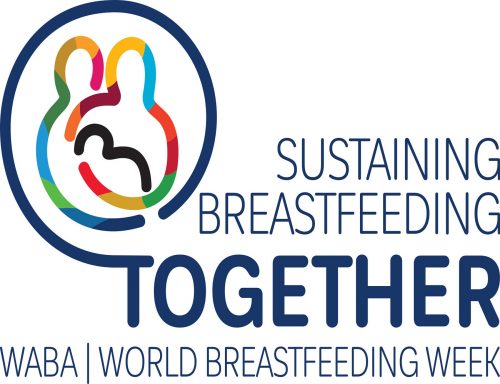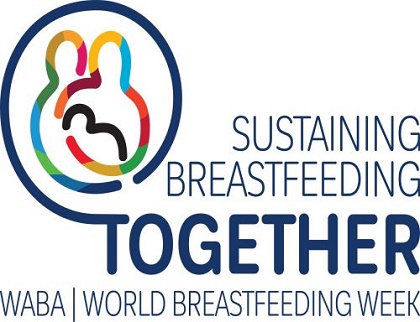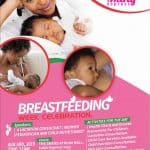
World Breastfeeding Week (1st-7th August) is an annual event highlighting the critical importance of breastfeeding for children across the globe. Breastfeeding gives children the healthiest start in life. It is also one of the simplest and most cost-effective ways available to ensure that all children survive and thrive.
Breastfeeding is the normal way of providing young infants with the nutrients they need for healthy growth and development. According to Tedros Adhanom Ghebreyesus the Director-General of the World Health Organization (WHO), “Breastfeeding gives babies the best possible start in life”. Breastmilk works like a baby’s first vaccine, protecting infants from potentially deadly diseases and giving them all the nourishment they need to survive and thrive.
WHO and UNICEF recommended optimal breastfeeding practices:
- Initiation of breastfeeding within the first hour of life
- Exclusive breastfeeding for 6 months is the optimal way of feeding infants. Exclusive breastfeeding – the infant only receives breast milk without any additional food or drink, not even water
- Breastfeeding on demand – No use of bottles, teats or pacifiers
- After 6 months, infants should receive complementary foods with continued breastfeeding up to 2 years of age or beyond
The theme of this year’s World Breastfeeding Week is “Breastfeeding: Foundation for Life” —
It is a recognition of the importance of breastfeeding to a baby’s future. Establishing exclusive breastfeeding – feeding infants nothing but breastmilk for the first six months of life — helps young children grow, preventing undernutrition, promoting brain development, and reducing the risk that children will become overweight. Breastfeeding is also a newborn’s first vaccine, providing vital antibodies and an immunity boost.
From the earliest moments of a child’s life, breastfeeding can mean the difference between life and death. Putting newborns to the breast within the first hour of life safeguards against newborn deaths. In fact, improving breastfeeding practices could save the lives of 823,000 children under age five every year.
Benefits of Breastfeeding
The Evidence on the benefits of breastfeeding is abundant. Breastfeeding aids the survival of infants and helps them thrive. It has long-term health benefits for women, yields economic benefits and enhances the well-being of all. The 2016 Lancet Breastfeeding Series provides an up-to-date analysis of available research on breastfeeding. Improved breastfeeding practices have the potential to save the lives of 823,000 children and 20,000 women a year and contribute significantly to long-term health.
The Global Breastfeeding Scorecard
The Global Breastfeeding Scorecard, a new report by the UN Children’s Fund (UNICEF) and WHO in collaboration with the Global Breastfeeding Collective – an initiative launched on August 1st 2017 that aims to increase global breastfeeding rates – points out that breastfeeding not only helps prevent diarrhoea and pneumonia, two major causes of death in infants, it also helps reduce mothers’ risk of ovarian and breast cancer, two leading causes of death among women. Yet, the scorecard, which evaluated 194 nations, reveals that no country in the world fully meets recommended breastfeeding standards. It found that only 40 per cent of children younger than six months are given nothing but breastmilk. In addition, only 23 countries have exclusive breastfeeding rates above 60 per cent.
A major reason why women do not adhere strictly to WHO and Unicef recommendations on breastfeeding is the fact that they have to return to work. The number of days allocated for paid maternity leave doesn’t afford mothers the time to indulge in full breastfeeding practice. Experts advocate introduction of crèches by businesses to enable working mothers to stay close and breastfeed their infants on demand.
Reasons why it’s essential for mothers to comply with WHO and UNICEF recommendations on breastfeeding:
- Children who are not breastfed during their first years are more likely to contract common illnesses such as diarrhea, pneumonia, and asthma, which are responsible for the deaths of almost 1.4 million children per year.
- Children who are breastfed are at least six times more likely to survive during their first months compared to non-breastfed children. And an exclusively breastfed child is 14 times less likely to die in its first six months than a non-breastfed child.
- According to studies, breastfeeding decreases the risk of breast cancer, cardiovascular disease and postpartum depression in a woman. It also helps with post pregnancy weight loss, helps the uterus shrink and reduces blood loss after delivery.
- Breast milk produced right after the baby is born helps the baby’s immunity and has minerals, vitamins, amino acids, white blood cells, and antibodies.
- Breast milk that is produced later has the nutrition that helps in the baby’s cognitive development. It prevents allergies and decreases the risk of other diseases.

